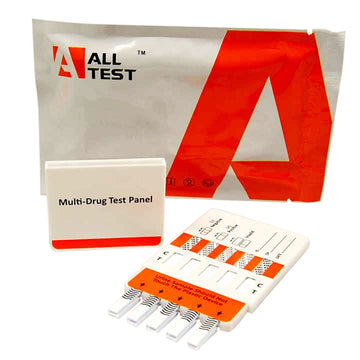Drug Testing In Schools
Drug and alcohol testing for schools a quick guide
Drugs in UK schools
Drug use is an increasing problem in the teenage population, and is affecting younger and younger children in the UK. Evidence from research suggests that the risk of pupils coming to school under the influence of drugs, or bringing drugs into school, has increased dramatically over the last 10 years. Drugs can not only affect the child that is taking them, but may have a knock-on effect on other pupils by disruptive behaviour related to drug use, affecting the learning and happiness of other students, and increasing peer pressure to take drugs.
The rise of vaping and the use of illegal vapes containing THC is also a growing concern for schools both in the UK and abroad. Recent studies have shown that vaping nicotine is in fact a gateway drug for children and young adults, and is associated with an increased risk of drug use and binge drinking, and the use of vapes by pupils is now causing significant disruption in the education sector.
Drug use outside school
This can also impact on school behaviour and attainment for the pupils taking the drugs, and also those around them.
Cannabis & synthetic Cannabis (K2 ) in particular can have marked effects on personality and mental health, and drugs may also increase the risk of violent outbursts and aggression in pupils taking them.
Drug use in school
Headteachers have a duty to the pupils in their care, not only to ensure a safe school environment, and a good learning environment, but also to look out for the welfare of their pupils, and to spot issues like drug abuse.
Pupils dealing drugs, and selling them to other pupils either in school or on way to or from school, is also an increased risk for schools, and teachers need to be vigilant.
Headteachers also need to be aware that members of the school staff may also be using drugs or alcohol, and that this may also need to be considered when drawing up a drug and alcohol testing policy.
Drug testing in schools pros and cons
Implementing drug testing in schools has its proponents and opponents. Supporters of drug testing in schools argue that it serves as a deterrent, identifies at-risk students early on, promotes a drug-free environment, and enhances parental awareness. Additionally, tying drug testing to participation in extracurricular activities is seen as a way to instill responsibility.
On the other hand, critics assert that mandatory drug testing in schools infringes on students' privacy, can result in false positives, may stigmatise students, and is costly to implement and maintain. There are concerns about the efficacy of such programs in reducing drug use, and some argue that they prioritise punishment over education and support for students facing substance abuse issues.
Balancing these considerations is crucial for schools contemplating the implementation of drug testing, ensuring a comprehensive and ethical approach that involves all stakeholders.
Consent is always required to perform a drug test on a pupil or member of staff in a school
If you wish to test pupils for drugs, you must first obtain their consent and also the consent of their parents. Either may refuse and this should be documented.
Download our editable consent and records document here
Do schools have to have a drugs policy
It is wise for all schools to make sure that they have a clear drug and alcohol testing policy for the school, that applies to the teachers and other members of staff, as well as the pupils.
As drug use in now so prevalent in the UK teenage population, it is advisable that all schools and in particular secondary schools have a drug and alcohol policy that makes it very clear that attending school while under the influence of drugs or alcohol, or bringing drugs into school is not acceptable. In this policy, you can also layout your drug testing policy.
It is also important to remember that drug and alcohol use is also common in the adult population, and it may be worth adding a section that relates to the drug testing of teachers and ancillary staff into your drug and alcohol policy.
UK school drug testing policy guidance
The Department for Education's guidance, Drugs: advice for schools, emphasises that any drug testing should be part of a clear, well-communicated school policy developed in consultation with students, parents, staff, and governors. This policy should outline the circumstances under which drug testing may occur and the procedures involved. Importantly, obtaining informed consent from students and, where appropriate, their parents or guardians, is always considered best practice.
For students under the age of 16, parental consent is typically required before any drug testing is carried out. In cases involving students aged 16 and over, they are generally considered capable of providing their own consent. However, schools are encouraged to always try to involve parents or guardians in the process, especially if the student is under 18, as they remain responsible for the student's welfare.
It's essential for schools to ensure that any drug testing procedures are consistent with their safeguarding policies and are implemented in a manner that respects students' rights, dignity and privacy. Schools should also be prepared to offer appropriate support and guidance to students who may be affected by drug-related issues.
For more detailed information, refer to the Department for Education's guidance on drug testing in schools: Drugs: advice for schools. https://www.gov.uk/government/publications/drugs-advice-for-schools
Your local council may also offer guidance.
This page on how to create a drug and alcohol policy provides valuable guidance for organisations including schools looking to write a new drug and alcohol policy or update an existing one. It offers clear information on best practices, legal considerations, and practical steps to create an effective, compliant policy tailored to your setting. By using this resource, you can ensure your policy addresses prevention, testing, support, and disciplinary procedures in a way that promotes a safe and healthy environment.
What drugs should we screen for in schools?
The obvious drugs to screen school pupils for are Cannabis & Synthetic Cannabis. These two are the drugs you are most likely to test positive for in this age group.
It is also worth testing for Ketamine, Opiates, Amphetamines, MDMA (Ecstasy), Methamphetamine (crystal meth) and Benzodiazepines but these will be detected less often than Cannabis. We have a 10-panel drug testing kit that is ideal for schools as it detects all these drugs.
Some schools also test for Cotinine (a metabolite of Nicotine) which means it is a smoking and vaping detection test.
Which drug testing kits should we use?
You may find our pick a drug test online quiz helpful to help you choose the best drug test kits for your schools particular needs.
The choice is between urine drug testing kits (as shown in the photo) and saliva (oral mouth swab testing). Saliva drug testing will tell you whether a pupil is under the influence of drugs while they are at school as the detection period is quite short. Urine drug testing will tell you if they are using drugs outside of school hours and at weekends as the detection period for drugs is much longer. You will get more positive drug test results if you go for urine screening.
Integrated cup urine drug testing kits
ALLTEST 10 panel (5+5) Schools Combination Urine Drug Test Kits
The combination of our standard UK combination 5 panel urine drug test kit, which tests for the 5 most common illegal drugs of abuse, with the NPS 5 panel urine drug test kit which screens for new psychoactive substances previously known as legal highs, offers a great value for money up to date drug screen for modern drugs of recreational and casual abuse for UK schools to use for their drug testing.
Order ALLTEST 10 panel (5+5) Schools Combination Urine Drug Test Kits

ALLTEST 12 panel NPS drug test kit
We have also put together a 12-panel combination drug testing kit for schools that includes 5 new NPS ( New Psychoactive Substances previously known as legal highs)
Random drug testing is not common yet in UK schools
Random drug testing is where you randomly test your student population for drugs at random intervals. This is not common yet in the UK. Random drug testing or the threat of it is slowly being introduced in some schools.
Random drug tests are more common in boarding schools where the pupils spend all of their time, often for months at a time. Random drug testing may also be introduced for a period of time following an incident in the school, which has been confirmed as drug-related.
Random drug screening is not yet popular in schools as it is more time consuming and more costly than post-incident testing, and most of your results would be negative unless there was a major drug problem in the school.
Post-incident drug testing is the most common form of drug testing in UK schools
The most frequent type of drug testing in schools is when an incident or accident has happened in a school, and the pupil or pupils involved are thought to be under the influence of drugs. The drug test is performed to confirm or refute the suspicion.
Confirming positive drug test results on school pupils
Any drug screening results that are not negative (ie positive ) will need to be confirmed with a laboratory chain of custody urine drug test pack if you intend to take any disciplinary action.
Contact us if you require any help or advice with implementing drug screening for your school
Monday to Friday 8.30am to 4.30pm


